

Chennai
A British citizen appeared at a public hospital in the capital with a cough, difficulty breathing and a private clinic’s referral for a coronavirus test. She was turned away. Authorities said on Tuesday that they would not widely expand testing for the virus, as most affected nations are doing, despite mounting criticism from some experts that the limited tests could mask the true toll of the disease in the world’s second most populous country.
The World Health Organization has urged countries to test as many people as possible to curb the pandemic, but the country has taken a different approach, limiting testing to those who have travelled from affected countries or come in contact with a confirmed case and shown symptoms after two weeks of quarantine. On Tuesday, authorities expanded the population eligible for testing to health care workers with symptoms who are treating patients with severe respiratory illnesses. But officials said the WHO guidance didn’t apply in the nation because the spread of the disease has been less severe than elsewhere. Balaram Bharghava, who heads the Indian Council of Medical Research, the country’s top medical research body, said the guidance was “premature” for India, where community transmission hadn’t yet been detected.
“Therefore, it creates more fear, more paranoia and more hype,” he said. The British patient sent home from the hospital last week in New Delhi didn’t fulfil the country’s testing criteria. The woman, who requested anonymity fearing business consequences for her employer, said she told hospital officials that she may have had contact with a coronavirus patient in her hospitality sector job, but couldn’t be sure. After trying and failing to be tested a second time, she left the country this week for France, where her family lives, and which President Emmanuel Macron said Monday was “at war” with the virus, announcing extreme measures to curb it.
Authorities have justified their strict testing limits as a way to keep a deluge of people from demanding tests that would cost the government money it needs to combat other diseases such as tuberculosis, malnutrition and HIV/AIDS. ICMR said on Tuesday that there was no need to offer such testing more widely. However, authorities said they’re preparing for community spread by bolstering their lab testing infrastructure. As a result of the stringent criteria, sick people with potential exposure to the new virus are being sent home, and some experts fear that the nation’s case-load could be much higher than government statistics indicate.
Bharghava said virus infections in the country can still be traced back to people who travelled into the country from affected locales. He said if community transmission is detected, then testing protocols would be revised. Authorities have confirmed over 138 cases, most of which have been “imported” — linked to foreign travel or direct contact with someone who caught the disease abroad. India is conducting only about 90 tests per day, despite having the capacity for as many as 8,000. So far, 11,500 people have been tested.
But concerns of so-far undetected communal spread are growing. “Given the pattern of disease in other places, and given our low level of testing, then I do think that community transmission is happening,” said Dr Gagandeep Kang, the director of the Translational Health Science and Technology Institute.
In India, where more than 400 mn people live in crowded cities, including many without regular access to clean water, the disease could spread rapidly, experts say. “Community spread is likely. The only way to know for sure is through expansive testing,” said Dr Anant Bhan, a global health researcher in Bhopal. The virus causes mild or moderate symptoms - fever and cough, for most people, but severe illness is more likely in the elderly and people with existing health problems.
India has a lower proportion of elderly than other countries, but its health care facilities are limited and already can’t accommodate the large number of patients with other diseases. “This along with our high population density can be our great challenge,” said public health researcher Oommen Kurian. India has been reluctant to expand testing, not wanting to trigger panic and overwhelm hospitals, but also because of the cost: While the tests are free for patients, each one costs the government about Rs 5,000.
In a stretched, underfunded public health care system, money spent on the coronavirus leaves less for other public health problems. The coronavirus may also be spreading in India as health officials have struggled to maintain quarantines, with people fleeing from isolation wards, complaining of filthy conditions. In Maharashtra, five people, one of whom had tested negative and the rest who were awaiting test results, walked out of an isolation ward last Saturday. India has implemented a 19th century epidemic law that empowers public officials to enforce more rigorous containment measures and impose penalties and punishments for escapes.
Lav Agarwal, a health ministry official, rued that authorities “often don’t get enough support from people.” In Sri Lanka, the government ordered 170 passengers who evaded airport screening after returning from affected countries to report to police or face financial penalties and possible imprisonment.
Aditya Bhatnagar, a university student who was studying in Spain, described unsanitary conditions at an isolation ward where he and 50 others passengers on a Barcelona flight have been kept since landing in New Delhi on Monday. Bhatnagar said the rooms, shared by around eight people each, lacked basic hygiene features such as clean bed sheets and bathrooms. He said the group, awaiting their COVID-19 test results, was not provided with masks or sanitiser.
“I don’t think these measures would contain the pandemic,” Bhatnagar said, adding that some passengers had opted to move from the wards and into private hotels, paying Rs 4,000 a night to self-isolate for at least 14 days.
-Additional reporting by Sheikh Saaliq and Bharatha Mallawarachi
Visit news.dtnext.in to explore our interactive epaper!
Download the DT Next app for more exciting features!
Click here for iOS
Click here for Android